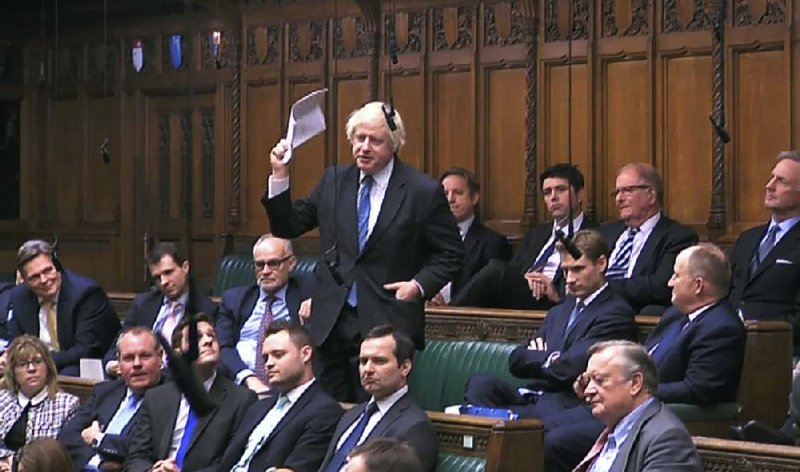LONDON -- Britain's Parliament dealt Prime Minister Theresa May's government two bruising defeats Tuesday, and that was before lawmakers began a debate that will decide the fate of May's European Union divorce deal and her political career.
Opening five days of debate on the agreement, May said that since the British people voted in 2016 to leave the EU, it was the "duty of this Parliament to deliver on the result" of the referendum.
Despite her entreaties, the government appeared to be on a collision course with an increasingly assertive Parliament.
Minutes before May rose to speak, lawmakers delivered a historic rebuke, finding her Conservative party government in contempt of Parliament for refusing to publish the advice it had received from the country's top law officer about the EU-split deal.
The reprimand, while largely symbolic, marks the first time a British government has been found in contempt of Parliament. The 311-293 vote demonstrated the fragility of May's government, which does not have a majority in Parliament.
Keir Starmer, the Labor Party official in charge of overseeing the EU exit, called the contempt finding "a badge of shame."
The government said that in light of the vote it would publish the advice from Attorney General Geoffrey Cox. He and other ministers also could face reprimands or suspension from Parliament.
The main thrust of Cox's advice is already known -- the government released a 43-page document about it Monday in a bid to fend off the contempt motion.
In another sign of the government's weakness, lawmakers also passed an amendment giving Parliament more say over the government's next steps if the assembly rejects the exit deal in a vote set for Tuesday.
The deal, endorsed last month by the 27 other EU leaders, lays out the terms of Britain's March 29 departure from the bloc and sets the framework for future relations with the EU. Rejecting it would leave the U.K. facing the prospect of a chaotic "no-deal" split, but May's chances of winning majority backing for the deal appear slim.
Politicians on both sides of Britain's EU membership debate oppose the agreement -- anti-EU legislators because it keeps Britain bound closely to the EU, and pro-EU politicians because it erects barriers between the U.K. and its biggest trading partner.
"The numbers in the Houses of Parliament look pretty formidable for Theresa May," said Alan Wager, a research associate at the U.K. at the Changing Europe think tank. "Over 100 Conservative [members of Parliament] have said they are not going to back the deal, the Labor Party have said they are not going to back the deal. So it looks like the deal won't pass next week."
May acknowledged the proposed deal her government negotiated and approved was not perfect, but called it "an honorable compromise."
"We should not let the search for the perfect Brexit prevent a good Brexit," she said.
Leaving the EU without a deal would end more than 40 years of free trade and disrupt the flow of goods and services between Britain and the EU. The Bank of England says a no-deal split could plunge Britain into a severe recession, with the value of the pound falling by 25 percent as unemployment and inflation soared.
Pro-EU lawmakers said Tuesday that they had made the prospect of no deal less likely by securing the amendment giving Parliament more power to guide the government's next steps if the deal is rejected.
If the agreement doesn't win approval, the government is required to come back within 21 days and say what it plans to do. The amendment, which also was backed by two dozen Conservative party lawmakers, stipulates that Parliament can change the government's statement -- effectively telling the government what to do. Since most lawmakers oppose leaving the bloc without a deal, they could essentially take that option off the table.
In a boost to campaigners seeking to stop the departure, a top official at the European Union's highest court advised Tuesday that Britain can change its mind about leaving the European Union if it wants.
Advocate General Manuel Campos Sanchez-Bordona told the European Court of Justice that EU law "allows the unilateral revocation of the notification of the intention to withdraw."
The advice of the advocate general is often, but not always, followed by the full court, which is expected to issue a final verdict on the question within weeks.
May insisted that the referendum could not, and should not, be reversed.
In an appeal to Parliament, the prime minister defended the deal against the steady criticism of opponents.
May said she had reached a deal with the EU "through painstaking hard work."
"I didn't play to the gallery," May said. "I have never thought that politics was simply about broadcasting your opinions on the matter at hand.
"Don't let anyone here think that there's a better deal to be won by shouting louder," she said.
Information for this article was contributed by Pan Pylas of The Associated Press.
A Section on 12/05/2018
